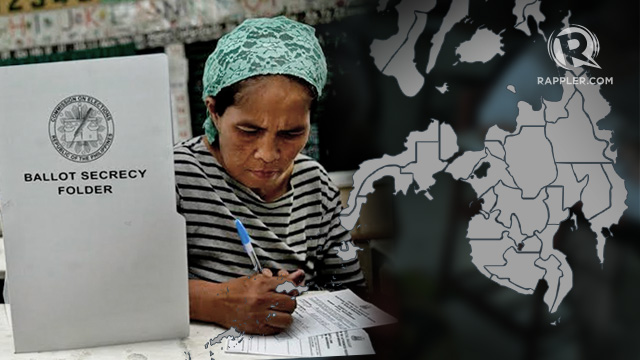![]() For the first time in Philippine electoral history, labor contractualization is a pivotal campaign issue. Also for the first time, Presidential candidates are declaring their commitment to end contractualization. In the third and last presidential debate on April 24, all 5 candidates categorically vowed to put an end to the practice of contractualization.
For the first time in Philippine electoral history, labor contractualization is a pivotal campaign issue. Also for the first time, Presidential candidates are declaring their commitment to end contractualization. In the third and last presidential debate on April 24, all 5 candidates categorically vowed to put an end to the practice of contractualization.
This common declaration of presidential candidates suggests that no matter who wins, contractualization will be ended. It is safe to assume that workers and labor unions must be jubilant over such declaration. But is there really cause for celebration?
Moreover, employers have not come out openly against the candidates' declaration and have claimed that they too are against "abusive" contractualization. A big retail company even came out in public to deny allegations that it was a violator of contractualization laws and that in fact, it had "no contractual workers.”
Is there really a national consensus to "end" contractualization? And can the next president really end contractualization?
Questions to ask candidates
We examine this particular political moment and ask some questions that may seem simple but actually entail quite complex answers: What is the contractualization issue about? Why has it been difficult to end contractualization? What can the next president do?
We leave the question of "which presidential candidate can do it" to the readers/voters. We suggest, however, that voters challenge their candidates to answer the following questions to prove their sincerity and political will to end contractualization.
For candidates with family businesses:
- Do their family businesses hire contractual workers? If yes, did they do anything to stop contractualization in these businesses?
- If elected president, will they oppose their own families over contractualization?
For candidates who were mayors:
- During their terms, did their LGUs employ contractual workers? If yes, why did they not stop such contractualization?
For candidates who were legislators:
- Did they support the Security of Tenure bill which sought to regulate contractualization further? If no, why not?
For all candidates:
- Have they ever supported labor unions that have been at the forefront of the advocacy to end contractualization? If no, why not?
- If elected president, are they willing to go against all employers who violate contractualization laws including those who contributed large sums of money to their electoral campaigns?
What is the contractualization issue about?
The contractualization issue relates to the right of workers to be secure in their jobs. Contractualization is a business practice that violates this right because it denies the existence of an employer-employee relationship and/or avoids the regularization of workers.
Article XIII, Section 3 of the 1987 Philippine Constitution guarantees "that the state shall afford full protection to labor" and workers "shall be entitled to security of tenure, humane conditions of work, and a living." This constitutional right is elaborated by the Philippine Labor Code and several Department Orders of the Department of Labor and Employment (DOLE) particularly DO-18 A, Series of 2011.
Philippine laws do not prohibit lawful subcontracting or contractualization per se. They only define what practices are allowed and what practices are unlawful. They also define the rights of contractual workers.
Business entities are allowed by law to hire the services of a subcontractor provided that the latter is a "legitimate" contractor and not a "labor-only" contractor.
In legitimate contracting or subcontracting under DO 18-A, Series of 2011, “the contractor must carry a distinct and independent business and undertakes to perform the job, work or service on its own responsibility, according to its manner and method, and free from control and direction of the principal in alll matters connected with the performance of the work except as to the results thereof.”
![JOB HUNT. Prospective employees check potential employers at a jobs fair. File photo by Ritchie Tongo/EPA]()
This is actually the most crucial requirement, the other two in the same provision being quite easy to comply with: 1) That the contractor has substantial capital and/or investment; and 2) There is a service agreement between the principal and the subcontractor that ensures compliance with all the rights and benefits under Labor Laws (DO 18-A, Series of 2011, Section 4).
Incidentally, DO 18-A stipulates that a contractor must have a capitalization of at least 3 million pesos.
DO 18-A also states that the workers that the contractor is supplying must NOT be "performing activities which are directly related to the principal business of the employer." This is in keeping with the Labor Code provision (Article 280) that workers who perform work that is "necessary and desirable" to the company must be considered as regular workers. Said workers may be allowed to go through a probationary period of 6 months but they should be given regular status if they are allowed to work after that period.
If their work is not necessary and desirable, they could be treated legally as casual employees, except that “any employee who has rendered at least one year of service, whether such service is continuous or broken, shall be considered a regular employee with respect to the activity in which he is employed and his employment shall continue while such activity exists.”
It is thus illegal to classify a worker who has been working in a company for several years as "casual" or "contractual" just because her/his employment has not been continuous.
Circumventing laws
The fundamental problem is that many businesses circumvent these labor laws.
Almost all of the contractualization practiced at the moment, where employees are considered to have ended their contracts before they have worked for 6 months (hence the term "ENDO"), are illegal. No less than the DOLE concedes that DO 18-A was crafted "to protect the workers by prohibiting the repeated hiring of employees for a five-month duration, known as 5-5-5 and ENDO."
Typically, a new hire's probationary period is 6 months, so the employer argues that, regardless of the nature of work, it commits no violation if the worker is dismissed a day prior to the 6th month of employment. However, the Supreme Court has ruled that if the employee's work is necessary and desirable to the business, under Article 280, said employee should be considered as regular, even if he or she signed a contract providing for a fixed period of less than 6 months.
Prior to the expiration of such period, an employee can be dismissed if he or she really fails to meet the standards made known to her/him at the time of hiring. The standards, however, must be reasonable.
Under a lawful contracting or subcontracting agreement, the principal employer can enter into a contract with a legitimate subcontractor who will then deploy the subcontractor’s contractual workers to the principal employer. But these workers should be given the same rights as regular workers, as in fact they are regular workers, albeit of the legitimate subcontractor. Example: Big Manufacturing Inc wants to landscape its premises so it hires Landscaping Inc to do the job for two months. Landscaping Inc deploys its regular workers to work on the premises of BMI.
DO 18-A, Series of 2011 states that contractual workers such as "reliever, seasonal, week-ender, temporary, or promo jobber" shall be accorded "all rights and priviliges as provided in the Labor Code.
These are safe and healthful working conditions; labor standards such as service incentive leave, rest days, overtime pay, holiday pay, 13th month pay; separation pay as may be provided in the Service Agreement of under the Labor Code; setirement benefits under the SSS, or retirement plans of the contractor, if any; social security and welfare benefits; self-organization, collective bargaining and peaceful concerted activities; and security of tenure.
While it correctly protects the rights of workers to minimum labor standards, this section is actually misleading because it gives the impression that since the worker needed by the principal employer is “only” a reliever, seasonal, week-ender, temporary, or promo jobber, the principal employer can recruit the workers through a labor contractor, with the latter as the purported “employer” and the principal a mere “client” of the labor contractor.
Employers often use this specific provision to justify their labor-only contracting practices that are actually unambiguously illegal. (READ: Why contractualization should stop)
According to Rene Ofreneo, former Dean of UPSOLAIR, contractualization represents "vulnerable employment" because it refers to "the increasing informalization and casualization of the formal economy."
Ofreneo posits that contractualization has caused labor unions to weaken because unionized jobs are being replaced with contractual jobs. He cites two examples: the PLDT union whose membership dipped from 10,000 to 2,000 because of contractualization and the Philippine Airlines Employees Union (PALEA) "that had a bitter fight with management regarding the outsourcing of 2,600 jobs occupied by unionized regular workers.”
Needless to say, many labor unions share Ofreneo's view that contractualization is detrimental to workers.
The Kilusang Mayo Uno or KMU-led Alliance Against Contractualization and Towards Significant Wage Increase Now (ACT2WIN) has been calling for "the junking of contractualization." Another labor alliance, NAGKAISA of which the PALEA union is a part of, has been pushing for a security of tenure law. There is also the UPAC (Union Presidents Against Conractualization).
Contractualization is a huge social problem because it creates an "underclass" within the working class. It condemns a huge section of the workforce into being perpetual minimum wage earners and perpetually exempt from the payment of income tax. Thus, businesses are subsidized by the workers through cheap labor and by the state in the form of foregone income tax revenue.
The contractualization issue is about the abuse of our workers. It is indeed high time we end this abuse.
Why has it been difficult to end contractualization?
Global process
The contractualization that we see today is part of the global process of labor market deregulation that started in the 1980s. It entailed a shift from a Fordist model of production to a "new economy" type of production.
In the latter type, the demography of both the employers and employees changed drastically. Instead of business owners and managers that workers interacted with in their workplaces, employers became "manpower agencies" that merely supplied labor to "principals." Instead of regular workers, the working population was broken into "core" workers employed by the principals and "periphery" workers hired by manpower agencies. Keeping a core-periphery workforce rather than a rigid, regular workforce was deemed necessary to "compete globally." Enterprises allegedly could not compete if they were burdened with very high costs of labor and very rigid rules on sustaining labor.
Contractualization has proliferated because it has been buttressed by economic arguments that are considered by many as more important than all other arguments. When businesses declare that they have to hire contractuals because "it is in the nature of their industry to do so" or "demand is just seasonal" or "we are already suffering from the global financial crisis," governments often believe them and bend over to accommodate their concerns. Workers too have come to believe that "contractual jobs are better than no jobs at all."
Contractualization has not been stopped because people have been conditioned to believe that it is a solution rather than a problem. Moreover, there is very strong lobby from business.
Business groups argue that the right of workers to security of tenure must not undermine management prerogative in hiring and firing workers. In its 2010 "Omnibus Position Paper on the House Bills on Security of Tenure," the Employers Confederation of the Philippines (ECOP) claimed that the constitutional right to security of tenure does not mean "perpetual employment" and that both employees and employers "have an equality of right guaranteed by the Constitution."
According to ECOP, compelling an employee to work for an employer against his/her will is "servitude" but in the same manner, compelling an employer to hire an employee against his or her (the employer's) will is "oppression."
This particular argument, however, is a "false" argument because in truth, our laws do not compel employers to hire workers on a "perpetual" basis. Employers, in fact, can hire and fire workers freely – they only have to follow public policies relating to labor rights. Under the Labor Code, dismissal must be for a just or authorized cause.
The working population, meanwhile, including the unions that seek to represent them, have very weak bargaining power vis-a-vis employers. Union membership and power have steadily declined. In 1980, union density or the proportion of workers in the total workforce joining unions was 27%. Today, it is only 8.5%.
The right to unionize is a constitutional right so technically, contractual workers can join unions. Many workers, however, opt not to exercise this right, because they fear that once they do, they will lose their jobs. Furthermore, collective bargaining agreements often stipulate that the bargaining unit consists only of regular workers leaving out any possibility for contractual workers – who, in most cases, constitute the majority of the workforce – to participate in unions or partake of benefits gained from collective bargaining.
Challenge for next leader
What can the next president do?
To stop contractualization, the next [resident can and should strengthen the institutions that have organizational mandates to protect workers: the DOLE and labor unions.
The next president should appoint a competent, pro-labor DOLE secretary. If the president chooses someone known to be anti-labor and anti-union, this is a sure sign that his or her anti-contractualization stance is merely lip service.
The DOLE secretary must have the political will to insist on labor law compliance and to mobilize the DOLE bureaucracy towards this end. DOLE must insist, for example, that businesses cannot use economic arguments to circumvent the law. A business entity cannot use these arguments in the same way that it cannot use economic arguments to tell BIR Commissioner Kim Henares that it be taxed only 15% since 30% is too high. Similarly, an employee cannot justify stealing by explaining that his/her salary is not enough.
The next president must also guarantee and enhance the participation of unions in policy making and implementation by expanding spaces for union representation in tripartite mechanisms. The next president, through DOLE, can also initiate discussions on the possibility of industry-wide bargaining that could give workers and unions more bargaining leverage than enterprise-level bargaining (i.e since enterprise level unions are easier to bust).
Strengthening unions will not be easy because some employers are quite vocal in their opposition to unions. The ECOP, for example, opposes the provision in DO 18-A that "requires the employer to consult the union in a CBA before it can contract out" since for them, such is "unreasonable, restrictive, and potentially disruptive."
Pushing for the participation of labor unions in ending contractualization thus requires political will on the part of the next president.
The next president will also have to generate support from the legislative branch to pass the Security of Tenure law which will:
- Make the violation of contracting laws an "unfair labor practice"
- Penalize said violation by a fine of not less than P50,000.00, on top of the payment of wages and benefits due workers wrongly classified as contractuals
- Limit valid subcontractiving from anywhere between 10% to 20% of a firm's workforce
Needless to say, the next president will have to address the broader 'jobs crisis." Decent work – jobs that pay well and make workers feel well and secure – must be the aim of the next president.
In this connection, the next president can build on the industrial policy that the Department of Trade and Industry has been working on but this has to be combined with appropriate labor policies. Moreover, the idea of giving businesses incentives so they can keep their workforces must be studied carefully because as mentioned earlier, the state, in fact, is already subsidizing businesses through cheap labor and contractualization. The state must assist and give incentives to small and fledgling businesses but it should stop subsidizing established and huge corporations.
No president has stopped contractualization. Can the next president do it? Yes, but the question is: Will she or he do it?
Let's talk again in 2022. – Rappler.com
Carmel Abao is a faculty member of the Department of Political Science of the Ateneo de Manila University while Tony Salvador is a lawyer who works with various NGOs and unions on economic rights issues.
![]()
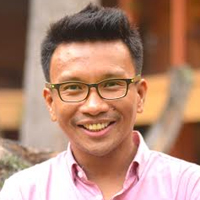 Some are already celebrating, some are not. But one thing is clear: many people are baffled by the rise of Duterte. It is incredible that a mayor from Mindanao can make it to the national scene.
Some are already celebrating, some are not. But one thing is clear: many people are baffled by the rise of Duterte. It is incredible that a mayor from Mindanao can make it to the national scene.  In 2014,the United Nations Population Fund (UNFPA), released the State of World Population report, The Power of 1.8 Billion: Adolescents, Youth and the Transformation of the Future, which discussed the potential economic gains that countries with large working age population can enjoy through a “
In 2014,the United Nations Population Fund (UNFPA), released the State of World Population report, The Power of 1.8 Billion: Adolescents, Youth and the Transformation of the Future, which discussed the potential economic gains that countries with large working age population can enjoy through a “


 Two years ago
Two years ago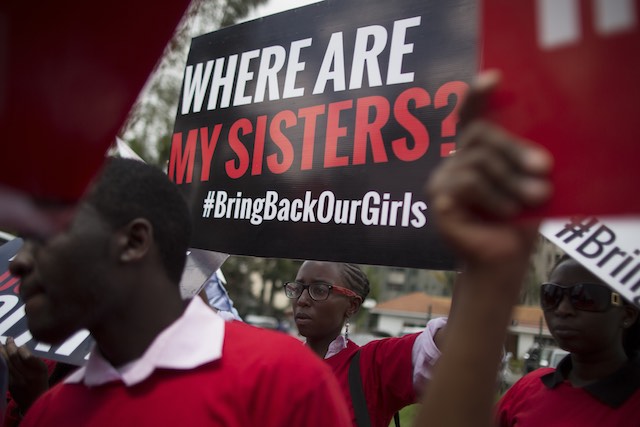
 Are we so callous as to disregard the pervasive
Are we so callous as to disregard the pervasive 



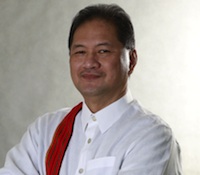
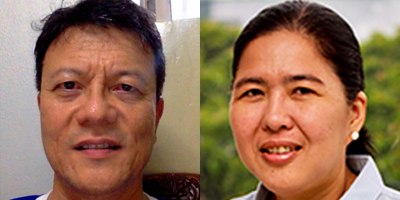 For the first time in Philippine electoral history, labor contractualization is a pivotal campaign issue. Also for the first time, Presidential candidates are declaring their commitment to end contractualization. In the third and last presidential debate on April 24, all 5 candidates categorically vowed to put an
For the first time in Philippine electoral history, labor contractualization is a pivotal campaign issue. Also for the first time, Presidential candidates are declaring their commitment to end contractualization. In the third and last presidential debate on April 24, all 5 candidates categorically vowed to put an 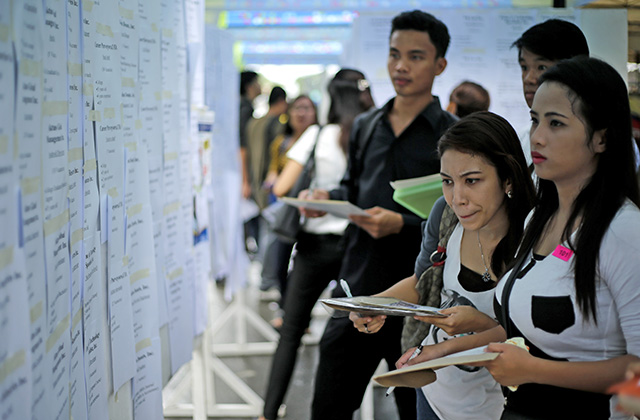
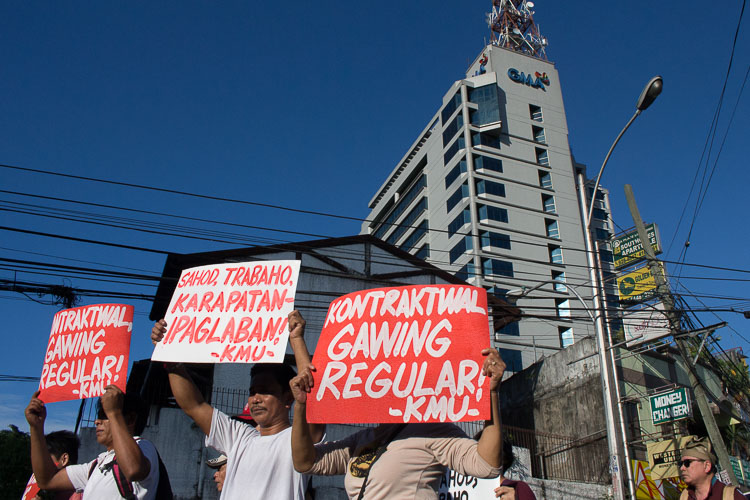
 This is the second piece of a 3-part collaborative series by the authors to explore the US and Philippine elections side-by-side. The first piece focused on the countries’ respective electoral systems. (READ:
This is the second piece of a 3-part collaborative series by the authors to explore the US and Philippine elections side-by-side. The first piece focused on the countries’ respective electoral systems. (READ: 
 Film director Yam Laranas expects to be unFollowed over this. He expects to be trolled with more than the usual vitriol. UnFriended and cast out of the "Twitter-verse". Stabbed multiple times and labeled a traitor like
Film director Yam Laranas expects to be unFollowed over this. He expects to be trolled with more than the usual vitriol. UnFriended and cast out of the "Twitter-verse". Stabbed multiple times and labeled a traitor like 
 Once more we have a whole nation abnormally riveted on the
Once more we have a whole nation abnormally riveted on the 





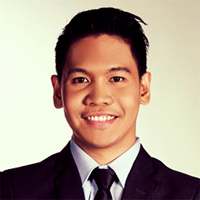 Jonathan Yabut is the proud Filipino winner of the hit Asian reality TV show, The Apprentice Asia and is currently based in Kuala Lumpur as the managing director of his own marketing consultancy firm, The JY Ventures & Consultancy. Jonathan is Asia’s leading motivational speaker on topics involving leadership, development of Gen Y workers, and career management for Fortune 500 companies. He is also the author of Southeast Asia’s 2015 best-selling motivational book, From Grit to Great.
Jonathan Yabut is the proud Filipino winner of the hit Asian reality TV show, The Apprentice Asia and is currently based in Kuala Lumpur as the managing director of his own marketing consultancy firm, The JY Ventures & Consultancy. Jonathan is Asia’s leading motivational speaker on topics involving leadership, development of Gen Y workers, and career management for Fortune 500 companies. He is also the author of Southeast Asia’s 2015 best-selling motivational book, From Grit to Great. These past few weeks, the temperature has gone through the roof in the Philippines and in social media, where conversations about politics have engaged everyone.
These past few weeks, the temperature has gone through the roof in the Philippines and in social media, where conversations about politics have engaged everyone.
 Stakes are high in the upcoming
Stakes are high in the upcoming 